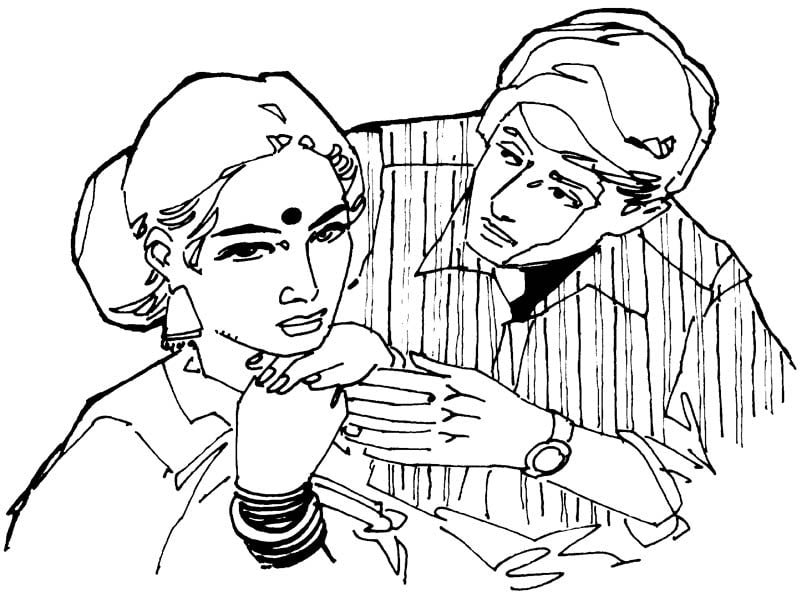When joint family system is almost on the verge of collapse, multiple problems of married couples have grown multifold. When a couple opts to break away from rest of the family and stays independently, it has to arrange for all the requisite necessities of life. Mounting expenses and depleting income are the major causes of unhappy married life. There would have been no problem in life, if money could buy peace of minds. Possession of household goods and luxuries has no end and

avarice to a mass luxury goods is too deep to allow even a normal respite. When comfort and rest are sacrificed for the sake of luxuries of life, the chances are that we buy unrest which, in turn, surfaces in the form of tension, worry and uneasiness. Golden principle is to work to the extent that your body is not unduly overtaxed, and arrange for only bare necessities of life. Try to be content with what you have and avoid running after unwanted objects.
Family peace is destroyed when lady of the house has also to work in an office, thus leaving the children to the care and protection of servants who, at times, make away with valuables in the house. If money is earned at the expense of your child care and education, you are a dismal loser. You may gain money but you actually lose affection of your children who, too, do not show any regard or attachment towards you. A cohesive and well-kept family is considered to be a happy family. There are still many families when children and their parents happen to meet each other on Sundays or holidays only. If you remain tense and stressed, you lose the affection of your children, fail to interact with them and cannot redress their grievances, then what is the good of such earning? Even while gaining in wealth, you are, through and through a loser.
In a tired, overworked, fatigued and overtaxed body, one cannot stay in peace. When mind is not cheerful, your body cannot remain healthy. You have to strike a balance between the two, if you want to remain free of stress. When physical and mental relaxation is available at premium, you are most likely to lose your cool. Stress is a resultant end of the excesses which we commit, overtly or covertly.
An executive had once remarked that the moment I enter my house, all my mental agitation, tension and fatigue goes off, when I see my beaming wife and cheerful kids. What an excellent way to relieve tension! What about those return home mentally and physically broken down, cannot enjoy even with their family, and without interaction, rush to their bed-rooms.
Another cause of constant worry for the working couple is as to how to ensure safety of their homes and if young toddlers are left to the care and nursing of maid servants. In most of the cases, the houses are burgled in broad-daylight and even innocent children are murdered, to leave no room for any evidence. Sense of social insecurity is one of the leading causes of tension.
Tension between husband wife also leads to bad health and growth of children, and even elders. In order to lead a happy married life, free from all effects of stress, the couple may try following methods :

- They should iron out all their differences in the true spirit of give and take, leaving no room for any confusion. Mutual understanding is needed to maintain peace in the family.
- Children should be spared the mental torture of fight between their parents and other elders
- Sex is a stress relieving device which will relegate even major discordant factors to the background. No solution is far away if both the parties strive honestly to reach an agreeable solution.
- Better seek help from a marriage counsellor.
- Never let your family peace be disturbed due to official problems nor vice-versa.
- Never publicise your differences with your spouse, otherwise you will make yourself a laughing stock, and you won’t enjoy respect in your office or at home. Try to learn how to live in amity even with odd situations.
- Do not be a marriage ignorant and marriage illiterate. Success in marital relations lies in appreciating other partner’s viewpoint whereas head-on-collusion often leads to disaster.
- Adopt a constructive, conciliatory and sympathetic approach and be sensitive to your partner’s feelings. If you have understood your partner and his/her approach to life and events, you have won more than half the battle.
- Beware of trouble shooters and mischief mongers who will do every act to cash upon your differences with your spouse. It is always better and wiser to trust your partner than to give credence to unfounded rumours. In some cases suspicion proves as a major stumbling block. Remember, faith is the edifice upon which structure of marriage is built.
- Infidelity wrecks peace of mind but when suspicion and distrust are also present, it will simply make inconvenient partners living under compulsion. Never commit the blunder of trailing the movements and contacts of your partner. Some persons even seek the help of outside spying and detective agencies to chase their partners.

Incompatible income, family background and status injury feeling of self-respect. Be always envious but never be jealous, and never try to let down your partner. If you have any point which needs clarification, it should always be sorted out in camera, without any help of third party. Elements of jealousy and suspicion are more apparent in men than in women, though rare exceptions, on either side, cannot and should not be ruled out.
Always discuss but never argue, when you argue, your attention is more on deriding the other party.
In his monumental book entitled, How To Win Friends and Influence People Dale Carnegie commands six cardinal points to make your home life happier and the recipe suggested is applicable to both husband and wife.
Rule 1 : Don’t try to make your partner over
Rule 2 : Don’t Nag
Rule 3 : Read a good book on the sexual side of marriage
Rule 4 : Don’t criticize
Rule 5 : Give honest appreciation
Rule 6 : Be courteous, and lastly
Here is a set of questions each for husbands and wives to judge for themselves if they measure up to the laid down scale of self-assessment.
Questionnaire For Husbands
- Do you still ‘Court’ your wife with an occasional gift of flowers, with remembrances of her birthday and wedding anniver-sary or with some unexpected attention, for some unlocked for tenderness?
- Are you careful never to criticize her before others?
- Do you give her money to spend entirely as she chooses, above the household expenses?
- Do you make an effort to understand her varying feminine moods and help her through periods of fatigue, nerves and irritability?
- Do you share atleast half of your recreation hours with your wife?
- Do you tactfully refrain from comparing your wife’s cooking or housekeeping with that of your mother or wife, except to her advantage?
- Do you take a definite interest in her intellectual life, her clubs and societies, the books she reads, her views on civic problems?
- Can you let her dance with and receive friendly attentions from other men without making jealous remarks?
- Do you keep, alert for opportunities to praise her, and express your admiration for good relation?
- Do you thank her for the little jobs she does for you, such as sewing a button, darning your socks, and sending your clothes to the cleaners?
Let every husband weigh himself on the assessment scale given above. If you can score more than 70 points, giving yourself 10 points of each affirmative reply or more, you are an ideal husband. Those falling below 50 need to improve a lot but there is no reason for any disdain or worry. It is better not to say anything for those who are below 30. Let such husbands search their conscience and try to find out as to why they are lacking and where improve-ment is needed—they need a lot of soul searching and introspection.
Questionnaire For Wives
- Do you give your husband complete freedom in his business affairs, and do you refrain from criticizing his associates, his choice of a secretary, or the house he keeps?
- Do you try your best to make your home interesting and attractive?
- Do you vary the household menu so that he never quite knows what to expect when he sits down to the table?
- Do you have an intelligent grasp of your husband’s business, so you can discuss with him helpfully?
- Can you meet financial reverses bravely, cheerfully, without criticizing your husband for his mistakes or comparing him unfavourably with more successful men?
- Do you make a special effort to get along amiably with his mother or (his) other relatives?
- Do you dress with an eye for your husband’s likes and dislikes in colour and style?
- Do you compromise little differences of opinion in the interest of harmony?
- Do you make an effort to learn games your husband likes, so that you can share his business hours?
- Do you keep track of the day’s news, the books and new ideas, so that you can hold your husband’s intellectual interest?
Let the wives weigh themselves to decide as to where and when they have erred, and make, efforts to plug the loop-holes by taking corrective steps.
From the above set of questionnaire a few common points emerge:
- Appreciate each other’s personal likes, dislikes.
- Avoid meddling in each other’s personal and official affairs.
- Overlook minor differences and areas of disagreement.
- Compromise with variable reverses and show mutual understanding,
- Sustain and appreciate each other’s varied interests and reciprocally participate, share and appreciate.
- Allow freedom to each other.
- Keep in view point preferences and make your menu and dining table sitting an occasion to enjoy.
- Do not be suspicious, rather have faith, trust and confidence in each other.

- Do not nag, criticise deride or insult each other and, that too, in the presence of children, relatives, friends etc.
- Do not forget to pay compliments, shower praises, remembrances and offering gifts on particular occasions.
- Respect your respective in-laws and other relatives.
- Try to be active participants in and share worries, sorrows and happy moments.
- Do not do anything that hurts self-esteem, prestige and personal preferences.
- Have mutual trust, faith and constructive approach to life and various events.
- Try to laugh away problems and find out workable solutions in the interest of family peace, amity and well-being.
